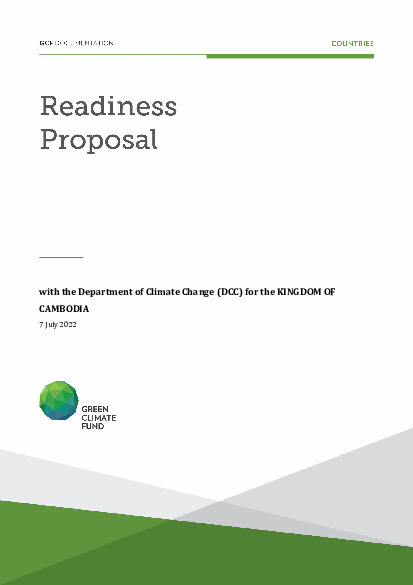Establishing an Evidence-Based National Adaptation Plan (NAP) process at National and Subnational Scales in Cambodia Phase 1

Establishing an Evidence-Based National Adaptation Plan (NAP) process at National and Subnational Scales in Cambodia Phase 1
Cambodia initiated the NAP process in 2014, establishing a strong foundation for the NAP process with its financing plan and communications strategy. Since 2014, the country has utilized the NAP process to identify and address vulnerabilities in key sectors (including agriculture, forestry, and fisheries; infrastructure; health; coastal zones; energy; and tourism). The NAP process has also been used to identify ways to improve adaptation planning itself at all levels (national to local). The proposed project builds on these efforts to address gaps and barriers that have already been observed and well-documented, including:
Data and information challenges. Barriers to mainstreaming include: low capacity to generate, manage, and disseminate climate information in useful formats; lack of consistent climate change scenarios; and insufficient involvement of academic institutions. Another constraint observed is sectoral issues. Some of the RGC policies and strategies (e.g. Rectangular Strategy, and National Strategic Development Plan) prioritize mainstreaming of climate change. Though significant progress has been made, there remain some issues to address: limited knowledge of climate change impacts on priority sectors; limited integration of climate change actions into line ministry budgeting and planning processes; and lack of capacity to develop sectoral adaptation plans. A third barrier is subnational issues; subnational levels of government face similar issues as the national sectoral ministries. At the same time, the government is currently in the midst of a decentralization effort that will ultimately reorganize and restructure governance at subnational levels, consolidating many powers and responsibilities at the provincial level. This decentralization process presents an ideal entry point for improving subnational capacities for climate change adaptation
planning and implementation. Barriers to be addressed include: Policymakers, planners, and technicians at subnational levels lack the information and knowledge on climate change impacts and how to address these in subnational planning processes Awareness of climate change impacts among non-government stakeholders at subnational levels is low, and meaningful participation in planning processes is limited; and there is no standardized mechanism for determining vulnerabilities, particularly within Cambodia’s fast-growing cities. The last challenge observed is communications issues, described comprehensively in Cambodia’s National Adaptation Plan Communication Strategy. Related issues include limited engagement among private sector stakeholders; limited messages on climate change impacts targeted to specific stakeholder groups and communities; a strong need to translate scientific knowledge about climate change into language accessible to different audiences; and limited effective communications efforts for sharing knowledge and information about climate change impacts and the NAP process.
This NAP support project, which has been fully developed and will be implemented by the Department of Climate Change of the General Secretariat of the National Council for Sustainable Development (GSSD), includes two phases of three outcomes each.
The overall objective of the project is to Strengthen institutional and scientific capacity in Cambodia to formulate and implement national, sectoral, and subnational climate change adaptation strategies and actions. It is envisaged that the project will greatly enhance the country’s ability to plan strategically for climate change, develop appropriate policies, plans, and projects/programmes, and access enhanced financing. The three outcomes include:
- Evidence basis produced to design adaptation solutions for maximum impact;
- Adaptation planning governance and institutional coordination strengthened; and
- Private sector engagement in adaptation catalyzed.
The current proposal is to support the first phase only, although details and proposed budget for the second phase have been included for reference. Phase 2 intends to build on phase one through three tentative outcomes. The first of these will continue engagement with universities to apply the evidence base from the first phase to address sectoral vulnerabilities, while the second outcome will focus on developing urban adaptation plans, and the third will further advance implementation of the NAP communications plan.
The direct beneficiaries of the project will be domestic universities and research institutions, government and non-government stakeholders in one municipality, private sector stakeholders (including MSMEs), and journalism/media professionals. Indirect beneficiaries will include current and future students at domestic universities, the government agencies and non-government stakeholders that ultimately receive the benefits from improved applied research capabilities at the universities, the residents of one municipality that is the site for outcome 2 activities, and Cambodian people that consume improved media and information products related to climate change and climate change adaptation. Overall, all Cambodians will benefit in some way from improved adaptation planning capabilities in the country.